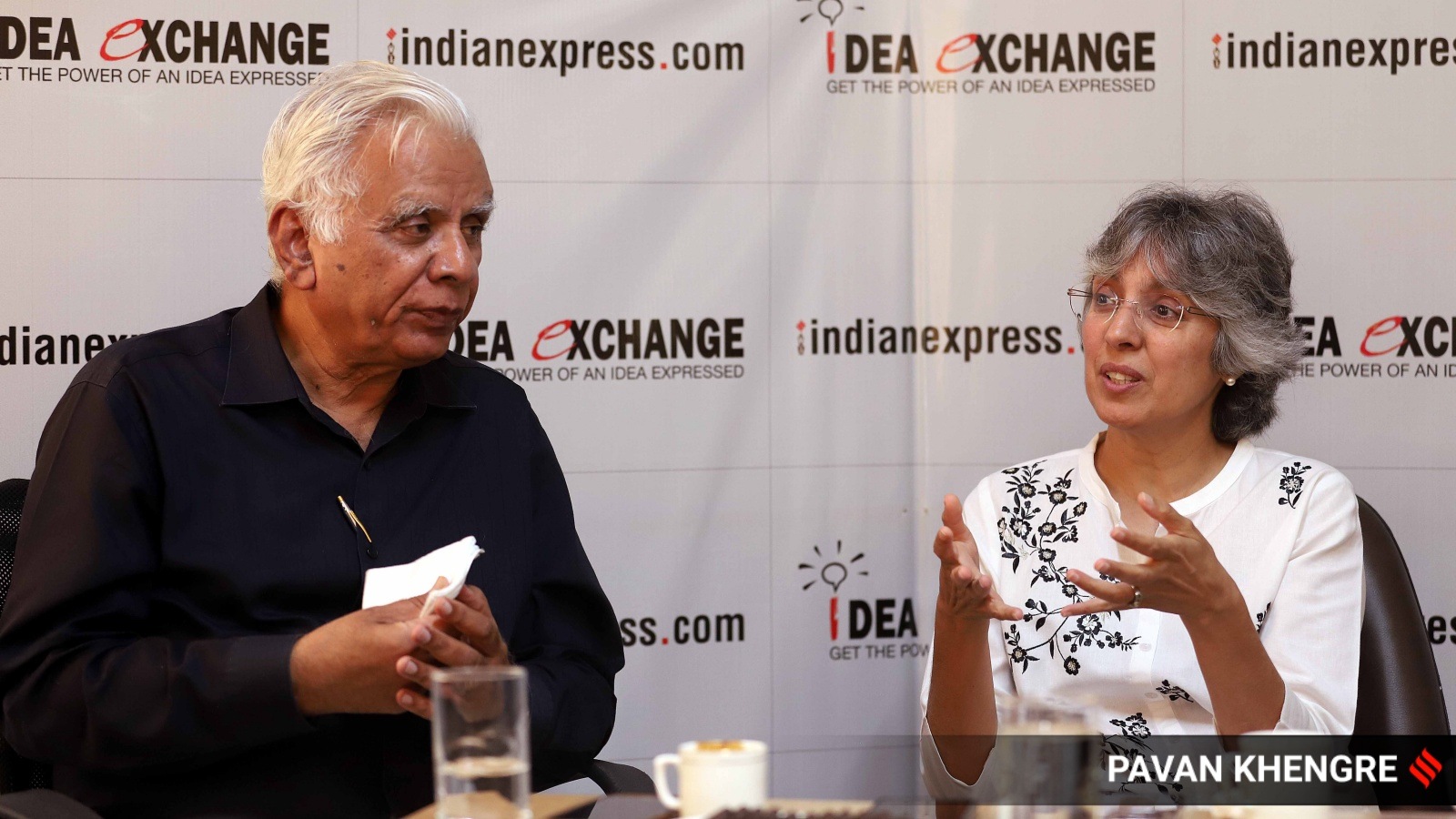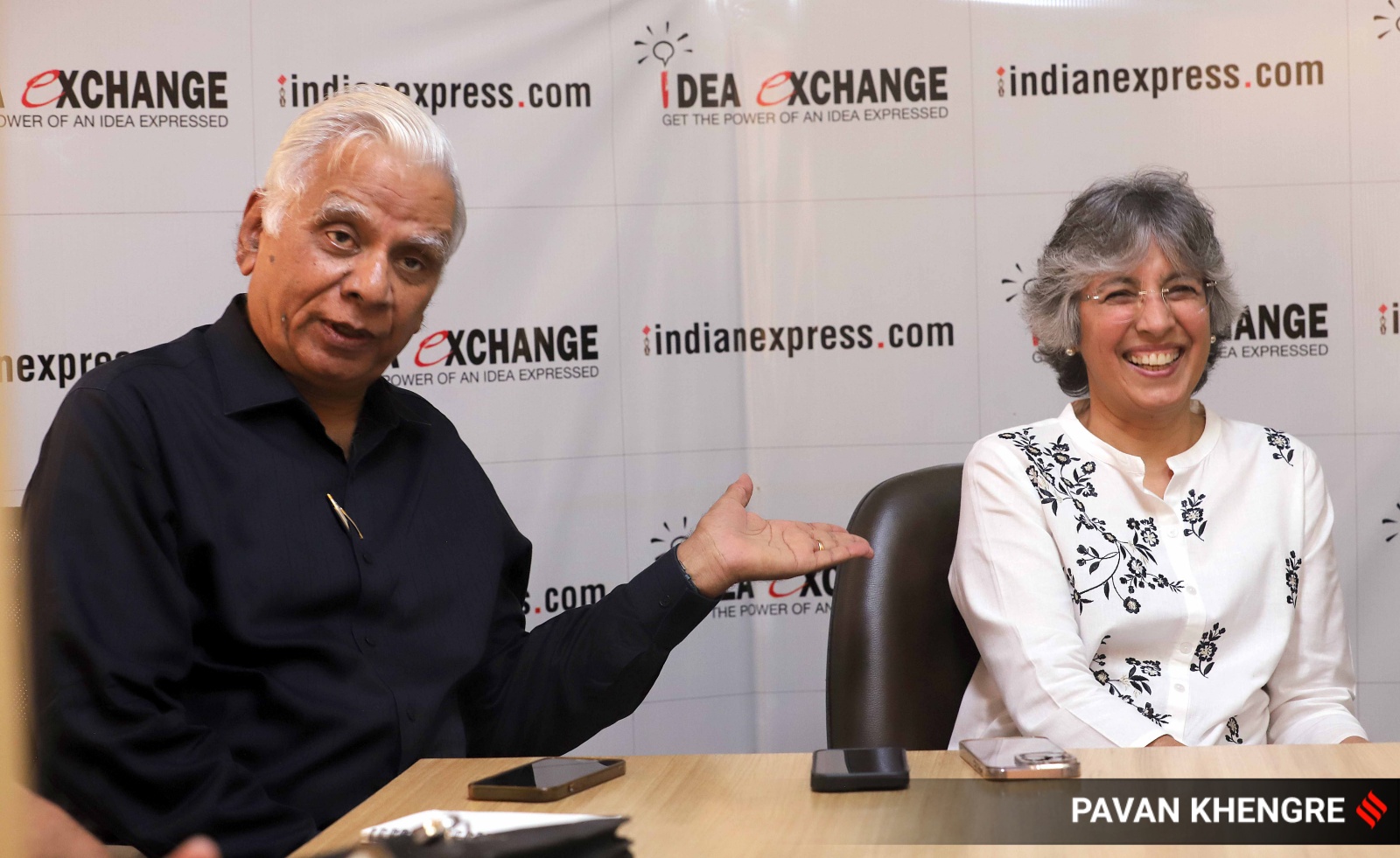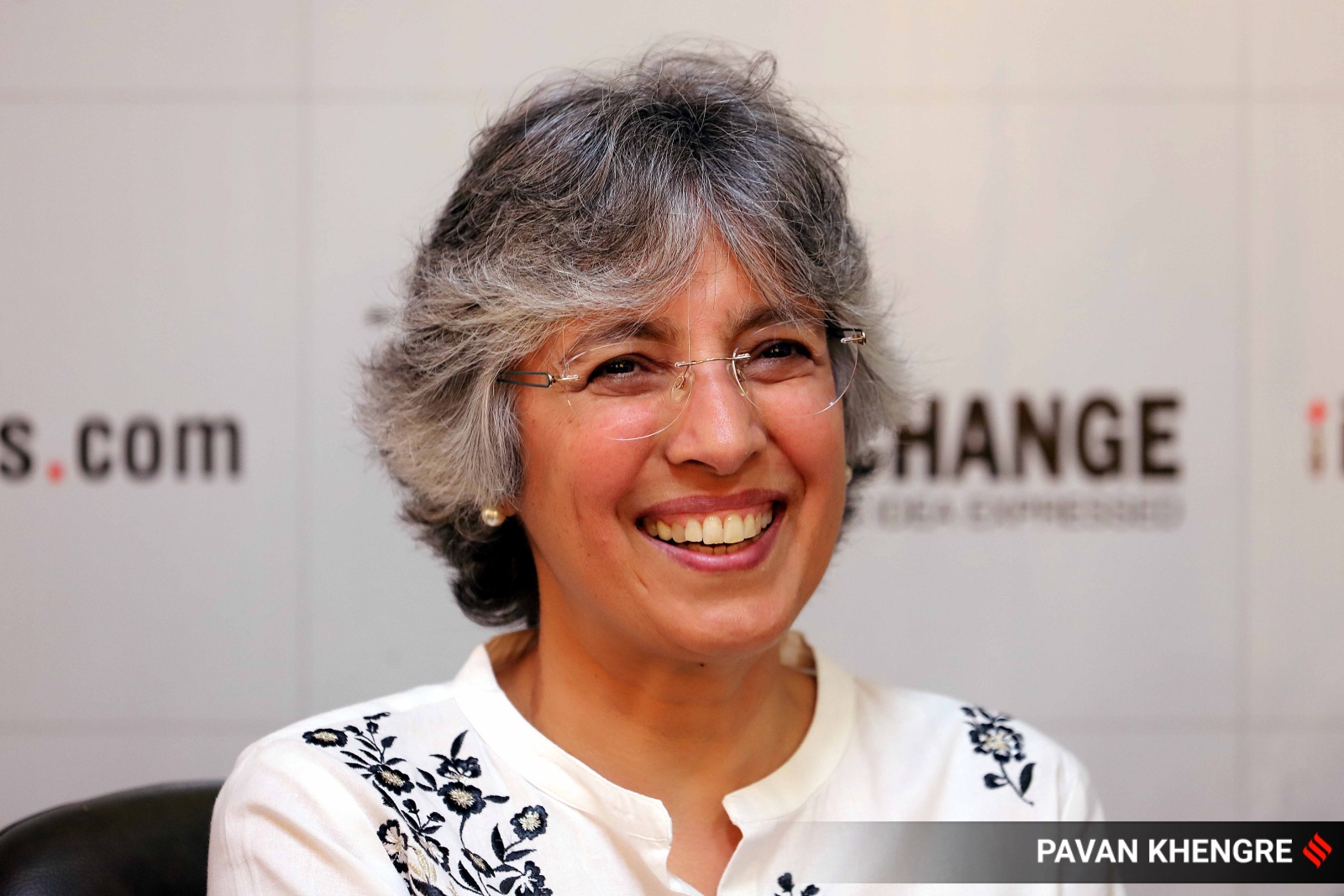Click here to join Express Pune WhatsApp channel and get a curated list of our stories
‘Strong need to look into inequality of unorganised workers, give them their dignity’
India is one of the few countries which has policies that make people invest in sustainable power generation. By 2030, 50% of our power generation would come from renewable sources, says Meher Pudumjee, Chairperson — Thermax Ltd.
 Meher Pudumjee, chairperson of Thermax and Pradeep Bhargava former president of MCCIA and CII at Idea Exchange organised by The Indian Express. (Express Photo By Pavan Khengre)
Meher Pudumjee, chairperson of Thermax and Pradeep Bhargava former president of MCCIA and CII at Idea Exchange organised by The Indian Express. (Express Photo By Pavan Khengre)Meher Pudumjee, Chairperson — Thermax Ltd, and Pradeep Bhargava, Chairman MCCIA Electronic Cluster Foundation and Former president — Mahratta Chamber of Commerce, Industries and Agriculture, speak to The Indian Express about their endeavour to usher in the concept of social assessment in the corporate world, something that goes beyond the 2% CSR requirement, to bring dignity and equity to informal industry-based workers in India.
Sunanda Mehta: How far has Corporate Social Responsibility (CSR) become an inherent part of corporate culture and conscientiousness? Or is it still something they feel they are only obligated to adhere to by law?
Meher Pudumjee: Talking about CSR, I would say initially it was a huge imposition, but over time a lot of corporates have CSR deeply entrenched in their culture. They are genuinely interested in systematic change and about volunteering for their people. I feel that volunteering should be need-based, the corporate should be able to identify and match the needs of the NGO they partner with. I think we will move towards that as many corporations are now also involved in mentoring… I would say we have moved a long way.
Anuradha Mascarenhas: Are there any specific examples you can provide?
Meher Pudumjee: Take Teach for India. It has corporate India signing up to talk to students on Teachers’ Day. A lot of them have done this now and they loved it. The leaders came and talked to the students, and students spoke to them. Some of them came with their hobbies. It was a great experience. It helps our kids become acquainted with the various career options available. In fact many now feel one day a year is not enough.
 Meher Pudumjee and Pradeep Bhargava at Idea Exchange organised by The Indian Express. (Express Photo By Pavan Khengre)
Meher Pudumjee and Pradeep Bhargava at Idea Exchange organised by The Indian Express. (Express Photo By Pavan Khengre)
Partha Sarathi Biswas: On ground we see there is a gap between what the need of CSR is and what CSR is doing. How do you bridge the gap?
Meher Pudumjee: Corporates choose how they want to spend their CSR, like whether they want to help through NGOs or do it themselves. If the NGO gets to know of that have to be addressed, they bring it to the notice of corporates and it is met.
Let us take the example of Akansha. It is a public private partnership with the Municipal Corporation of Pune. Even if I want to get my maid’s son or daughter admitted in Akansha schools, I can’t as the government has a lottery system which decides the admission. One must help as one can, and it should be for a larger long-term programme.
Pradeep Bhargava: The scale of challenge is huge. At the Lila Poonawalla foundation, we give scholarships to girls whose families’ yearly incomes is below Rs 2 lakh per annum. We go to the slums to identify the girls, but still, there are many who would be on the waiting list. Our Lighthouse Foundation identifies people in need. Corporates typically land up in giving support and rightly so I guess, to issues which are easy to measure. It is the philanthropist who will look at long drawn and basic needs. So over the years, all of it has become very transactional – it has seeped in everywhere. But I have hope that the younger generation will rise to the occasion as they are seeing the disparity in society and their own organisation.
 Meher Pudumjee feels that volunteering should be need-based, the corporate should be able to identify and match the needs of the NGO they partner with. (Express Photo by Pavan Khengre)
Meher Pudumjee feels that volunteering should be need-based, the corporate should be able to identify and match the needs of the NGO they partner with. (Express Photo by Pavan Khengre)
Anuradha Mascarenhas- Where do we stand in solar and wind power in power generation?
Meher Pudumjee: India is one of the few countries which has policies that make people invest in sustainable power generation. By 2030, 50% of our power generation would come from renewable sources.
Pradeep Bhargava: What India has done in terms of renewable power is phenomenal. India is way ahead of the curve and will remain so.
Partha Sarathi Biswas: Are Industry leaders worried about the growing inequality in India?
Pradeeep Bhargava: Indian Industry is a major stakeholder in the growth of society and the nation. There are two things they can do —One, through their actions they can make their services and products affordable and accessible to a larger consumer base. Industry has the charter to make offerings to a lot more people – and they are sensitive to it as there is a revenue model. Two, another question we should ask is what the industry is doing to address inequality within it itself. Forget the inequality in the country, there is inequality within the enterprise which has to be addressed. If you compare the ratios of a CEO’s salary to the median salary, there is a large gap. Our Economic Survey talks about a twoand a half times increase in profits of corporations. I was tracking the data. Minimum wages have not gone up. White collar wages have gone up by 10-12 per cent, organised sector increase is close to inflation. CEOs and CXOs’ compensation has pole vaulted. The white-collar sector can take out inflation and so can the organised sector. But 50 per cent of the workforce, who are contractual workers, face the harsh truth of inequality. What bothers me is the relative lack of sensitivity to the basic needs of these people. Their salaries are really low in Indian enterprises and have to be addressed.
Meher Pudumjee: It was only because of COVID that they were even noticed- when they came out in large numbers and began their exodus on foot.
Sushant Kulkarni: What are the mechanisms for impact assessment of CSR? Also, what kind of accountability is there for the same?
Meher Pudumjee: We have a monitoring methodology, and it is very set. Also, we must know what impact we want to make. For example, in school education some children might not be academically inclined – but they can be phenomenal in sports, arts. We need to encourage that. Our impact also affects the parents as that’s very important. We are also helping other companies look at it holistically.
Ravina Warkad: Apart from impact assessment, how much is the company engaged in its day-to-day operations?
Meher Pudumjee: We do not interfere in the day-to-day activities of the NGOs but we also tell them to be transparent with us. So we tell them to let us know if anything goes wrong.
Sunanda Mehta: But CSR is just 2 per cent. What about the other 98%? Should that also be looked or relooked at?
Pradeep Bhargava: We as an industry take away fair and unfair shares of resources and mess up the environment. We are doing very little to address the inequality – the industry says we are paying the taxes, let the government do the rest. We pretend that we are an island in the mainland. There are certain environmental, societal and governance norms which must be looked at. CSR is done for people who are not your stakeholders. But you need to address the inequality within your ecosystem – the 50 per cent of the unorganised force we talked about.
Sunanda Mehta: What is your plan to address this?
Pradeep Bhargava: In every enterprise’s journey, there is a certain set workforce that is part of us, who have worked for generations. They are part of the enterprise, but for various reasons are not on our payroll. India Inc contracts some of its activities out to contract labour. The huge disparity that has emerged in most enterprises in the treatment that is being meted out to them… some of them are not even paid the minimum wages, safety is not taken care of, they are not insured. If accidents happen, their medical care is not taken care of. They do not have a voice and are often invisible. Our heads count only people who are on our pay rolls.
We started this initiative wherein we help enterprises take stock on what is going on and make them hear the voices of these people. This initiative is not affiliated to any laid down ideology- but is affiliated to the ideology that you provide basic decency to people who work for you. Many people understand it but do not want to address this. Many are worried about affordability – they say increasing their wages is not economically feasible. Again, our survey showed that in manufacturing companies, if 100 is the turnover, the people cost is 8 per cent. The people who are 50 per cent of the workforce, their cost is less than 2 per cent. Even if you were to increase their wages by 20 per cent, the people’s cost increase would be in decimal point.
We pondered over this and formed a company called Social Compact Solutions which would look into this inequality.
Sunanda Mehta: So how would you describe this new company Social Compact and what does it do?
Pradeep Bhargava: Social Compact, a multi stakeholder platform, brings together corporates, worker organisations and experts into a co-solutioning relationship to ensure greater dignity and equity for the 1 million industry-engaged informal workers in India. Over the last 3 years, the movement has advised over 60 companies in India on building more transparent and inclusive systems for their 300,000 informal workers. It also builds a converging ecosystem to integrate this mission across industry influencers and regulators, to improve lives for the 200 million informally engaged workers across industry value chains in India. Through its worker facilitation centres, it has already linked over 11,500 workers with government benefits and unlocked assistance worth Rs 80 lakh.
Meher Pudumjee: Impermanent or contractual workers in Indian industries constitute more than 50% of its on-roll workforce. These informal workers form the bottom of the pyramid toiling 12 hours a day in adverse working conditions for 6 to 7 days a week, only to earn less than Rs 600 a day. Moreover, when companies resort to subcontracting, these wages drop further below. The stark informality was also observed in the Social Compact’s partner companies, wherein only two per cent of the companies issued formal contracts for these workers. These workers function remotely from the company’s system, with no direct form of communication to voice their concerns. Social Compact attempts to make this invisible workforce – both in sight and in paper – more visible, and ensure dignity and justice at their workspaces.
Partha Sarathi Biswas – What’s the model which would ensure decent payment to contract workers?
Pradeep Bhargava: All we are doing is appealing to companies and sharing data on what it would cost them to increase compensation to contract workers. We tell them about the benefits in such investment – companies with contractual labour always have the uncertainty about who is going to turn up for work the next day. In want of better payment, contractual labour might migrate and all the skill development that has happened would not be used by the company. So, what we tell them is that investment in them will give them good returns in the long run. Our help involves helping the companies “assess” what is it in there for them for such an exercise. We also have a workers facility centre to help contractual workers get enrolled for all the social security offered by the government, which is done through CSR. They can enroll for all the government run schemes like Ayushman Bharat.
Meher Pudumjee: Our company conducts a self-assessment for corporates, post which our team goes there and helps them look at it. For example, the companies mostly do not check if the contractor has given the contract workers an appointment letter. Even if that is given, it would be in English, which they would not be able to understand. So, we help them translate it. These little things go a long way.
Sunanda Mehta- How is it at Thermax? Can that be used as a model for corporates to follow?
Meher Pudumjee: I do not want to project us as a holier than thou company, because we are not. Yes, there are little things we have done – like minimum wages of course — but living wages, not yet. Can we do it overnight? Possibly not. Safety though has not been a compromise for us for the last 25 years. We consider anyone who works for us as a human being. In case of an accident, everyone is treated the same – and it’s been so from the beginning. But things like whether our contractors have issued appointment letters, even we did not get into that till SoCo came into the picture.
Anuradha Mascarenhas: What’s the response to this initiative? Who are the top players who have responded to you?
Pradeep Bhargava: First we did gratis work for companies for two years through philanthropy money. A team of eight people did this in the last two years. So now in the pipeline of about 60 plus companies and have got “purchase orders” for 7 of them. The company just started a month back. It is a journey that started with guilt – that in my 40 years of working, I pretended they did not exist and that is the story across the industry.
All that we want to tell the companies is that if you increase the salary of the contract worker, your EPS will not come down, but your ethic per share will go up. If you look at values and not valuation, your organisation can stand up and say we have done this.
Reporting about the S component of ESG has been difficult. The other challenge is that the board committees have restricted themselves to the CEOS, CXOs level, they do not want to discuss what is happening to the workers. The challenge is that 50 per cent of the workforce is not on the table.
Ajay Jadhav: Can’t this be implemented through MCCIA or CII?
Pradeep Bhargava: The charter of industry association is to do advocacy for industries that you cover. The charter of MCCIA is to create a certain amount of connection between trade suppliers etc. Industry bodies are expected to advocate for their members and bring about policy changes or customers. Of course, we are talking to industries- we have raised these issues with CII and MCCIA.
In the case of gig workers, some of their concerns can be addressed if the new labour codes are implemented.
Shubham Tigga: There is a large population of gig workers and there is no social security for them. I think some states like Karnataka, Telangana and Rajasthan have some sort of security for them. Shouldn’t something be done for them?
Pradeep Bhargava: I think something can be done very easily if the labour codes are implemented.
Click here to join Express Pune WhatsApp channel and get a curated list of our stories







